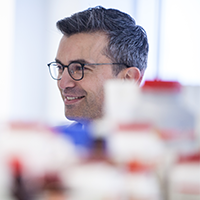-
PM-130
Fundamental Research Skills
This module is designed to develop the skills required for students of biochemistry and genetics degree programmes. Students meet with their tutors and will be given a series of assignments designed to develop skills in key areas such as essay writing, presentations and general numeracy.
-
PM-154
Human Physiology
Human physiology is the study of how our body works in an integrated way. A central principle of human physiology is homeostasis, the maintenance of a relatively stable internal environment. Failure to maintain homeostasis disrupts normal function that may lead to disease (or pathophysiology). Students will be taught the key concepts of homeostasis in the physiological systems of the body, enabling the student to understand the consequences of pathophysiology to human health.
Emphasis will be given to how malfunction of key physiological systems gives rise to disease, using specific examples to enable students to appreciate the relationship between physiology/anatomy and medicine. Fundamental principles of physiology will be illustrated with appropriate clinical examples and during lectures and in practical assignments.
Students will gain practical experience in assessing physiological function during four laboratory-based exercises. The impact of pathophysiology of such systems will be assessed through clinical case studies.
-
PM-154C
Ffisioleg Ddynol
Ffisioleg Ddynol yw astudio sut mae ein cyrff yn gweithio mewn ffordd integredig. Egwyddor sydd wrth wraidd ffisioleg ddynol yw homeostasis, sef cynnal amgylchedd mewnol cymharol sefydlog. Os na chynhelir homeostasis, bydd yn amharu ar swyddogaeth arferol a allai arwain at glefyd (neu bathoffisioleg). Caiff myfyrwyr eu haddysgu am gysyniadau allweddol homeostasis yn systemau ffisiolegol y corff, gan alluogi'r myfyriwr i ddeall canlyniadau pathoffisioleg i iechyd pobl.Rhoddir pwyslais ar y ffordd y mae methiannau systemau ffisiolegol allweddol yn arwain at glefyd, gan ddefnyddio enghreifftiau penodol i alluogi myfyrwyr i werthfawrogi'r berthynas rhwng ffisioleg/anatomeg a meddygaeth.Caiff egwyddorion sylfaenol ffisioleg eu hesbonio ag enghreifftiau clinigol priodol ac yn ystod darlithoedd ac mewn aseiniadau ymarferol.Bydd myfyrwyr yn cael profiad ymarferol o asesu swyddogaeth ffisiolegol yn ystod pedwar ymarfer yn y labordy. Asesir effaith pathoffisioleg mewn systemau o'r fath drwy astudiaethau achos clinigol.
-
PM-275
Introduction to neuroscience
In order to help students understand the biological basis for behavioural neuroscience and neurological disorders, this module seeks to integrate cell biology, physiology and biochemistry to understand the founding principles of neuroscience. The aim is to gain a mechanistic and holistic knowledge of the nervous system that builds from the molecular, cellular and developmental, to the systems level. In addition to exploring normal function, this module will introduce common disorders of the central and peripheral nervous systems in an integrated way. Students will be guided in exploring the scientific evidence around what is known and unknown and will be introduced to current research findings in the scientific literature.
-
PM-276
Neuroanatomy and neurology
Building on `An introduction to Neuroscience¿ this module will combine fundamental neuroscience with clinical neurology to provide a comprehensive understanding of the nervous system in health and disease.
-
PM-300
Medical Genetics
The course is designed to provide an advanced study of the identification of human genes and the determination of the influence of human genes upon disease and health status. Gene identification provides targets for the development of new pharmaceuticals and the range of variation present in the population.
-
PM-341
Human Biology and the Environment
This module is intended to provide an understanding of how our environmental factors impact on key aspects of human biology. Various environmental factors such as diet, stress, and pollution will be considered with a focus on their effects on epigenetics, inflammation, gut microbiota, mitochondrial health, and oxidative stress in non-communicable diseases in particular (e.g. chronic respiratory disease, cancer and metabolic disorders). The effect of extreme environments (e.g. altitude, space) and ageing on multiple organ systems will be considered. Students will gain practical experience in communicating these issues to scientific and non-scientific audiences.
-
PM-344
Capstone Project
The aim of this module is to provide a capstone experience to students¿ learning, through participating in their own enquiry-based research project, with guidance from an academic supervisor. The project may be laboratory or non-laboratory based, but it will always involve a research question that is drawn from the literature, and focused on a topic relevant to the life sciences. It will ask a research question and involve the critical analysis of research findings. Students will refine their oral and written communication skills to a graduate level through an oral presentation and dissertation on their research findings and conclusions.
-
PM-344C
Prosiect Capfaen
Nod y modiwl hwn yw darparu crynodeb o brofiad a dysgu myfyrwyr drwy ganiatáu iddynt gymryd rhan mewn prosiect ymchwil sy'n seiliedig ar eu hymholiadau eu hunain o dan arweiniad goruchwyliwr academaidd. Gellir cyflwyno'r prosiect yn y labordy neu'r tu allan iddo ond bydd bob amser yn cynnwys cwestiwn ymchwil a ddeillir o'r llenyddiaeth ac sy'n canolbwyntio ar bwnc sy'n gysylltiedig â¿r gwyddorau bywyd. Bydd yn gofyn cwestiwn ymchwil ac yn cynnwys dadansoddiad beirniadol o ganfyddiadau'r ymchwil. Bydd myfyrwyr yn mireinio eu sgiliau cyfathrebu llafar ac ysgrifenedig i lefel raddedig drwy roi cyflwyniad llafar a llunio traethawd hir ar eu canfyddiadau ymchwil a'u casgliadau.
-
PM-405C
Traethawd Hir Prosiect Ymchwil Uwch
Mae'r prosiect ymchwil uwch yn elfen allweddol o'r flwyddyn astudio olaf, gan roi cyfle i fyfyrwyr gael profiad o ymchwil arloesol yn y Sefydliad Gwyddor Bywyd a'r Ganolfan NanoIechyd am gyfnod estynedig o amser. Bydd y prosiect yn seiliedig ar un o'r themâu ymchwil sy'n ymwneud â'r gwyddorau meddygol. Bydd myfyrwyr yn defnyddio amrywiaeth o dechnegau dadansoddi uwch i ymchwilio i bwnc penodol. Yn ogystal, cânt brofiad o lunio cynnig ymchwil a chyflwyno eu data mewn amrywiaeth o fformatau. Dynodir pynciau ymchwil sy'n briodol i deitl gradd penodol.
-
PMGM17
Dissertation Project
The module is for students to build on their previous knowledge, skills and experience by undertaking a laboratory based or suitable non-laboratory based project on a specific subject related to genomics.
-
PMLM22
Laboratory Measurement Techniques for Medical Sciences
This module will enable students to understand the basic and advanced concepts of laboratory and measurement techniques used in medical sciences, how they may be applied with relevant methods of detection, gain `hands on¿ problem solving experience and strategic method development for complete bioanalysis according to target molecule characteristics and method application.
-
PMNM14
Contemporary Issues in Medical Science
This module will allow students to choose from a range of short contemporary topics in Medical Sciences including screening for new therapeutic compounds, using model systems to understand human disease and disorders, using behavioral tools and open-source analysis software to answer contemporary questions in neuroscience such as how defects in genes or drugs influence behavior. There will also be the opportunity to select introductory journal club or lean sessions with potential dissertation supervisors. The focus on techniques is complemented by seminars on the ethics of human and animal studies. Each topic will be approximately 1 day and students will be able to pick 4-5 topics.
-
PMNM17
Neurodegeneration & Repair
This MSc Medical Neuroscience module will study the processes involved in brain degeneration and repair. We will review disease pathology and diagnosis, the cellular and molecular basis of disease, and possible new therapies aimed at restoring brain function, including cell replacement strategies. Content will involve lectures, tutorials, expert guest seminars and workshops.
-
PMNM19J
Contemporary Issues in Medical Science
This module will allow students to choose from a range of short contemporary topics in Medical Sciences including screening for new therapeutic compounds, using model systems to understand human disease and disorders, using behavioral tools and open-source analysis software to answer contemporary questions in neuroscience such as how defects in genes or drugs influence behavior. There will also be the opportunity to select introductory journal club or lean sessions with potential dissertation supervisors. The focus on techniques is complemented by seminars on the ethics of human and animal studies. Each topic will be approximately 1 day and students will be able to pick 4-5 topics.


